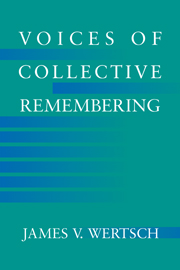Book contents
- Frontmatter
- Contents
- Introduction and Acknowledgments
- 1 An Encounter with Collective Memory
- 2 Methodological Preliminaries to the Study of Collective Remembering
- 3 Collective Memory: A Term in Search of a Meaning
- 4 State Production of Official Historical Narratives
- 5 Narrative Dialogicality and Narrative Templates in the Production of Official Collective Memory
- 6 The Consumption of Historical Narratives
- 7 Generational Differences in Collective Remembering
- Conclusion
- References
- Index
2 - Methodological Preliminaries to the Study of Collective Remembering
Published online by Cambridge University Press: 08 January 2010
- Frontmatter
- Contents
- Introduction and Acknowledgments
- 1 An Encounter with Collective Memory
- 2 Methodological Preliminaries to the Study of Collective Remembering
- 3 Collective Memory: A Term in Search of a Meaning
- 4 State Production of Official Historical Narratives
- 5 Narrative Dialogicality and Narrative Templates in the Production of Official Collective Memory
- 6 The Consumption of Historical Narratives
- 7 Generational Differences in Collective Remembering
- Conclusion
- References
- Index
Summary
The purpose of this chapter is to situate my perspective on collective memory, both in terms of theoretical and methodological commitments and in terms of broader historical context. The approach I shall outline does not fall neatly within any single academic discipline, a fact that I take to be an asset when studying this complex topic. Many research traditions have contributed to the study of this topic, and I believe it is important to draw on them as flexibly as possible. In this connection, I owe a great deal to studies in history, sociology, semiotics, psychology, and anthropology in particular, and the list does not stop there.
In developing my claims about collective remembering, I shall employ a set of illustrations. Indeed, several of the chapters that follow are almost entirely organized around such illustrations. These come primarily from a contemporary natural laboratory of collective memory: Russia as it makes the transition from Soviet to post-Soviet times. In particular, I shall be concerned with how state authorities in these two settings have played a role in shaping collective memory of an official sort. States are certainly not the only entities that try to purvey collective memory in the modern world, but they are unrivaled in the power and resources they have devoted to this effort. Indeed, their efforts constitute the most important experiment in collective memory in the world today, and hence make an obvious focus of study.
Sociocultural Analysis
The general theoretical framework I shall employ to hold the various strands of research on collective remembering together is what I term “sociocultural analysis” (Wertsch, 1991, 1998).
- Type
- Chapter
- Information
- Voices of Collective Remembering , pp. 10 - 29Publisher: Cambridge University PressPrint publication year: 2002



